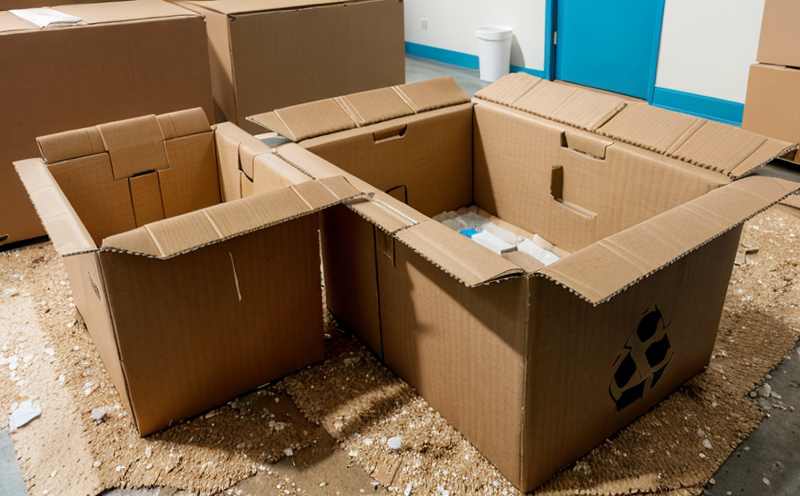TAPPI T585 Stickies Content in Recycled Paperboard
The measurement of stickies content in recycled paperboards is a critical aspect of quality control and compliance for the pulp, paper, and cardboard recycling industry. The TAPPI (Technical Association of the Pulp and Paper Industry) standard T585 specifies the method to determine the presence of adherent contaminants known as "stickies" within recycled paper products. These contaminants can significantly impact product performance, customer satisfaction, and environmental sustainability.
Stickies are typically defined as any non-paper material that adheres to recycled fibers during processing or use. Common examples include adhesives, inks, glues, staples, and other residues from manufacturing processes. The TAPPI T585 method aims to quantify these contaminants by assessing the amount of non-cellulose matter present on paper samples.
The standard is particularly relevant for quality managers, compliance officers, R&D engineers, and procurement specialists involved in the recycling and reprocessing of paper products. By adhering to this protocol, manufacturers can ensure consistent product quality, meet regulatory requirements, and maintain customer confidence in their brand.
To perform a TAPPI T585 test, samples are prepared by cutting paperboard sheets into standard-sized pieces using a defined procedure. The samples are then rinsed with distilled water to remove surface contaminants, followed by drying. A known mass of the dried sample is weighed and analyzed for stickies content using a gravimetric method.
The TAPPI T585 method provides clear guidelines on how to prepare specimens, what equipment to use, and how to interpret results. Compliance with this standard ensures that recycled paperboard meets specified quality parameters, thereby enhancing the overall performance of the final product.
In summary, the TAPPI T585 method is a vital tool for ensuring high-quality recycled paperboard by accurately measuring the stickies content. This helps manufacturers maintain consistent product standards and comply with industry best practices.
Industry Applications
- Quality Assurance: Ensures that recycled paper products meet specified quality parameters.
- Compliance: Helps manufacturers adhere to regulatory requirements and standards.
- R&D: Assists in the development of new recycling processes and technologies.
- Procurement: Enables the evaluation of incoming recycled materials for suitability.
The TAPPI T585 method supports various sectors within the paper industry, including pulp mills, paperboard manufacturers, converters, and suppliers. By implementing this standard, these entities can ensure that their products meet the highest quality standards, thus enhancing customer satisfaction and market reputation.
Eurolab Advantages
At Eurolab, we specialize in providing comprehensive testing solutions for the waste management and recycling industry. Our expertise in TAPPI T585 stickies content analysis ensures that our clients receive accurate and reliable results every time.
- Accurate Results: Our state-of-the-art laboratories are equipped with the latest technology to provide precise measurements of stickies content.
- Experienced Staff: Our team comprises highly trained professionals who have extensive experience in waste management and recycling testing.
- Comprehensive Services: We offer a wide range of additional services, including material characterization, quality assurance audits, and regulatory compliance support.
- Customer Satisfaction: Our commitment to excellence ensures that our clients achieve their goals with confidence and accuracy.
We pride ourselves on delivering high-quality testing services that meet the needs of our diverse customer base. Whether you need routine testing or one-off assessments, Eurolab is here to support your quality control and compliance initiatives.
Environmental and Sustainability Contributions
The measurement of stickies content in recycled paperboard plays a crucial role in promoting environmental sustainability. By ensuring that recycled materials meet strict quality standards, the TAPPI T585 method helps reduce waste and conserve natural resources.
Stickies can cause significant issues during paper recycling processes, leading to poor-quality products and increased costs for manufacturers. By identifying and removing these contaminants early in the process, the industry can minimize their environmental impact. This not only improves product quality but also contributes to a more sustainable future by promoting efficient use of resources.
Recycling is a vital component of waste management strategies worldwide. By adhering to standards like TAPPI T585, manufacturers can enhance their recycling practices and contribute positively to global sustainability efforts. This aligns with broader environmental goals such as reducing landfill waste, conserving water and energy, and decreasing greenhouse gas emissions.
At Eurolab, we are committed to supporting these initiatives through our expert testing services. By providing accurate stickies content analysis, we help clients make informed decisions that promote sustainable practices within the industry.





